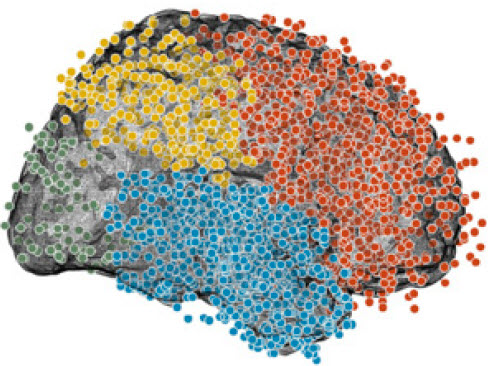Neural signature of ‘mental time travel’
July 19, 2011

Electrocorticographic recordings establish evidence for the context reinstatement hypothesis. Each dot marks the location of a single electrode. (Credit: Jeremy R. Manning et al.)
University of Pennsylvania and Vanderbilt University researchers have found neurobiological evidence for the context reinstatement hypothesis: that memories formed nearby in time become linked.
“When I remember my grandmother, for example, I pull back all sorts of associations of a different time and place in my life,” said University of Pennsylvania professor Michael Kahana. “I’m also remembering living in Detroit and her Hungarian cooking. It’s like mental time travel. I jump back in time to the past, but I’m still grounded in the present.”
To test this hypothesis, researchers made electrocorticographic recordings (subdural and depth electrodes) as 69 neurosurgical patients studied and recalled lists of words during treatment for drug-resistant epilepsy.
By examining the activity of the implanted electrodes, the researchers were able to measure when the brain’s response was similar to a previously recorded pattern. When a patient recalled a word, their brain activity was similar to when they studied the same word, the researchers said. In addition, the patterns at recall contained traces of other words that were studied prior to the recalled word.
“What seems to be happening is that when patients recall a word, they bring back not only the thoughts associated with the word itself but also remnants of thoughts associated with other words they studied nearby in time,” Kahana said.
Ref.: J. R. Manning, et al., Oscillatory patterns in temporal lobe reveal context reinstatement during memory search, PNAS, 2011; [DOI: 10.1073/pnas.1015174108]